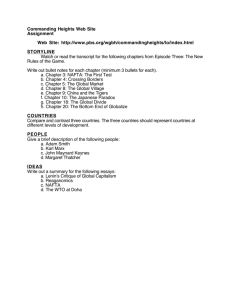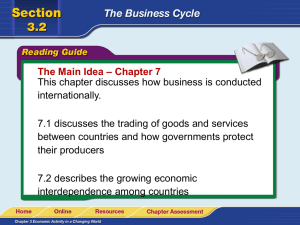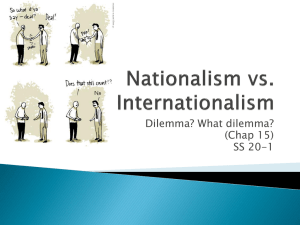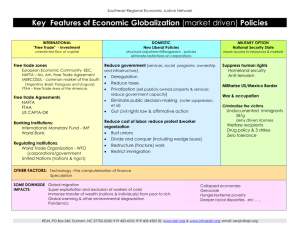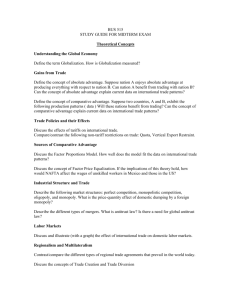2006-2007 Estimates Report on Plans and Priorities
advertisement
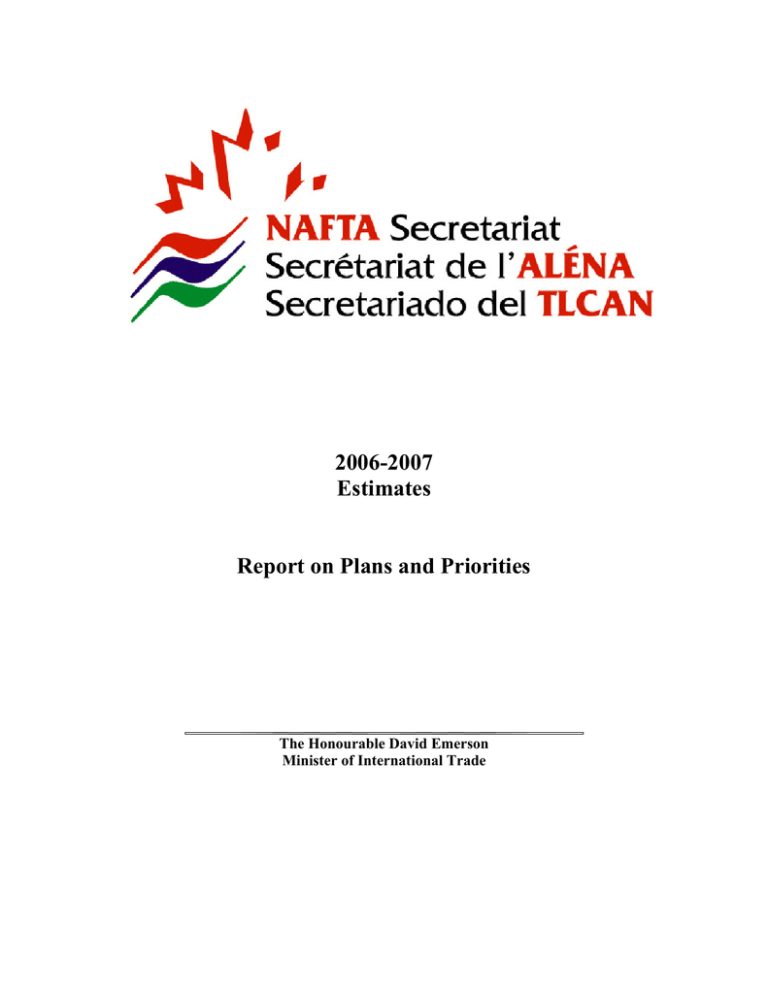
2006-2007 Estimates Report on Plans and Priorities The Honourable David Emerson Minister of International Trade TABLE OF CONTENTS SECTION 1: OVERVIEW 1.1. MESSAGE OF THE MINISTER.................................................................................. 1 1.2. MANAGEMENT REPRESENTATION STATEMENT ............................................ 2 1.3. DEPARTMENTAL OVERVIEW................................................................................. 3 1.3.1 REASON FOR EXISTENCE ...................................................................................... 3 1.3.2 FINANCIAL AND HUMAN RESOURCES .............................................................. 3 1.4 DEPARTMENTAL PLANS AND PRIORITIES ........................................................ 4 1.4.1 OPERATING ENVIRONMENT ................................................................................ 6 1.4.2 INTERNAL AND EXTERNAL FACTORS .............................................................. 6 SECTION 2: ANALYSIS OF PROGRAM ACTIVITIES BY STRATEGIC OUTCOME 2.1 STRATEGIC OUTCOME.............................................................................................. 7 2.2 PROGRAM ACTIVITY ................................................................................................. 7 2.2.1 ADMINISTRATION OF INTERNATIONAL TRADE DISPUTE SETTLEMENT MECHANISMS ............................................................................... 7 2.2.1.1 IMPROVED SUPPORT TO PANELS AND COMMITTEES ............................. 8 2.2.1.2 UNBIASED AND EQUITABLE ADMINISTRATIVE PROCESS ...................... 8 2.2.1.3 OPENNESS AND ACCOUNTABILITY................................................................. 8 2.2.1.4 INCREASED NATIONAL AND INTERNATIONAL COLLABORATION ................................................................................................... 9 2.3 WHAT THE PRIORITIES MEAN FOR CANADIANS ............................................. 9 2.4 PERFORMANCE MEASUREMENT STRATEGY .................................................... 10 2.5 KEY PROGRAM ............................................................................................................ 10 SECTION 3: SUPPLEMENTARY INFORMATION 3.1 ORGANIZATIONAL INFORMATION ....................................................................... 12 3.1.1 OVERVIEW.................................................................................................................. 12 3.1.2 RESULTS CHAIN BY STRATEGIC OUTCOME .................................................. 13 3.1.3 MANDATE.................................................................................................................... 14 3.1.4 ROLES ........................................................................................................................... 14 3.1.5 RESPONSIBILITY CHART ....................................................................................... 15 3.2 FINANICAL TABLES .................................................................................................... 16 TABLE 1: DEPARTMENTAL PLANNED SPENDING AND FULL TIME EQUIVALENTS .......................................................................................................... 16 TABLE 2: PROGRAM BY ACTIVITY ............................................................................. 17 TABLE 3: VOTED AND STATUTORY ITEMS LISTED IN MAIN ESTIMATES................................................................................................................. 17 i TABLE 4: SERVICES RECEIVED WITHOUT CHARGE ............................................. 18 TABLE 5: SUMMARY OF CAPITAL SPENDING BY PROGRAM ACTIVITY ........ 18 TABLE 6: SOURCES OF NON-RESPENDABLE REVENUE........................................ 18 TABLE 7: RESOURCE REQUIREMENT BY BRANCH OR SECTOR ....................... 19 SECTION 4: OTHER AREAS OF INTEREST 4.1 CORPORATE SERVICES ............................................................................................. 20 4.1.1 OPERATIONAL EFFICIENCY AND EFFECTIVENESS ..................................... 21 4.1.2 HIGHEST QUALITY OF SERVICE ......................................................................... 21 ANNEX A – GUIDING PRINCIPLES ................................................................................ 22 ANNEX B – OVERVIEW OF THE NAFTA DISPUTE SETTLEMENT PROVISIONS ............................................................................................................... 23 ANNEX C – HOW TO CONTACT US ............................................................................... 26 ii SECTION 1: OVERVIEW MESSAGE OF THE MINISTER Over a decade after the entry into force of the NAFTA, there is no doubt that it has served Canada well. Canadian merchandise exports to the United States grew at a compounded annual rate of 6.5% between 1994 and 2005. With regard to Mexico, bilateral trade in 2005 reached $17.8 billion, which represent a 292% increase from pre-NAFTA levels. In the past decade, however, the trade and economic environment in which NAFTA operates has changed considerably. An increasingly integrated trading network, with global sourcing of inputs, as well as redefined markets, drives the need for greater North American competitiveness. Therefore, Canada is working with its trading partners to ensure that the NAFTA continues to be an effective tool to help North America meet and beat the competition from new and emerging markets. For example, when I met with my U.S. and Mexican counterparts on March 23-24, 2006, under the NAFTA Free Trade Commission, we committed to work to achieve concrete, commercially-relevant results that will continue to ease the flow of goods, services and capital between the three countries. The Canadian Section of the NAFTA Secretariat, through its services of increasing quality in the management of international trade dispute settlement processes, also has a role to play in strengthening Canada’s international trade performance. Exporters and investors are far more likely to engage in international commerce when they have access to impartial dispute settlement mechanism and services, should disagreements arise. In this context, in 2006-2007, the NAFTA Secretariat, Canadian Section, will continue to focus on increased research support to panels and committees and on the implementation of ISO 9001: 2000 quality management standard. As well, it will continue its efforts to fully implement all provisions of the Public Service Modernization Act. These steps will allow it to continue to offer high-quality services in the management of international trade dispute settlement mechanisms for years to come. ___________________________________ The Honourable David Emerson Minister of International Trade 1 1.2 MANAGEMENT REPRESENTATION STATEMENT I submit, for tabling in Parliament, the 2006-2007 Report on Plans and Priorities (RPP) for the NAFTA Secretariat, Canadian Section. This document has been prepared based on the reporting principles contained in the Guide for the preparation of Part III of the2006-2007 Estimates: Reports on Plans and Priorities and Departmental Performance Reports: • It adheres to the specific reporting requirements outlined in the TBS guidelines; • It is based on the department’s approved Program Activity Architecture as reflected in its MRRS; • It represents consistent, comprehensive, balanced and reliable information; • It provides a basis of accountability for the results achieved with the resources and authorities entrusted to it; and • It reports finances based on approved planned spending numbers from the Treasury Board Secretariat. _________________________________ Françoy Raynauld, Ph.D. Secretary NAFTA Secretariat, Canadian Section ___________________________ Date 2 1.3 DEPARTMENTAL OVERVIEW 1.3.1 Reason for Existence To maintain a high level of impartial and independent service in the administration of the dispute settlement provisions of the North American Free Trade Agreement in order to help preserve the benefits of free trade. The NAFTA Secretariat is a unique organization established by the Free Trade Commission, comprised of the three ministers responsible for international trade in Canada, Mexico and the United States of America. The mandate of the NAFTA Secretariat also includes the provision of assistance to the Commission and support for various non-dispute related committees and working groups. More specifically, the NAFTA Secretariat administers the NAFTA dispute resolution processes under Chapters 19 and 20 of the NAFTA. A similar administrative body, the Binational Secretariat, existed under the Canada-United States Free Trade Agreement. In 1994, pursuant to the Parties' obligation under the NAFTA to establish permanent national section offices in each country, the Binational Secretariat, Canadian and United States national sections became the NAFTA Canadian and United States national sections, and with the addition of the Mexican Section, make up the NAFTA Secretariat. The national sections, which are “mirror-images” of each other, are located in Ottawa, Washington and Mexico City, and each is headed by a Secretary appointed by its respective government. Each national section maintains a court-like registry relating to panel, committee and tribunal proceedings. 1.3.2 Financial and Human Resources The following boxes provide information regarding planned spending on financial and human resources for the coming three-year period (see Section 2 for details): Financial Resources 2006-2007 2007-2008 2008-2009 $2,991,000 $2,991,000 $2,991,000 2006-2007 2007-2008 2008-2009 12 FTEs 12 FTEs 12 FTEs Human Resources 3 1.4 DEPARTMENTAL PLANS AND PRIORITIES The NAFTA Secretariat, Canadian Section, has one strategic outcome (See Table 1, below). The following table summarizes the five departmental priorities for 2006-2007 and the planned spending associated with each of them. The planned spending is further described in detail in Section 2. Table 1: Departmental Priorities Strategic Outcome A highly efficient, impartial and rules-based international trade dispute resolution process that benefits Canadian exporters to NAFTA countries, as well as NAFTA country exporters doing business in Canada Program Activity Administration of international trade dispute settlement mechanisms Planned Spending ($ thousands) Priorities (Consolidated) Type 2006-2007 2007-2008 2008-2009 Improved Support to Panels and Committees Ongoing 650 650 650 Expected Results Performance Indicators1 Improved support to panels and committees. At least 80% of our clients indicating that they were at least fully satisfied with the procedural advice and the relevance, timeliness and quality of information provided to them. Timely, accessible and responsive administrative processes. Unbiased and Equitable Administrative Process Ongoing 600 600 600 Unbiased and equitable administrative process that ensures the integrity of the NAFTA trade dispute resolution process. At least 80% of clients indicating that they are fully satisfied that the NAFTA Secretariat, Canadian Section, administered the dispute settlement provisions in a manner which ensured an unbiased and equitable administrative process. Openness and accountability Ongoing 120 120 120 Corporate culture that ensures transparency in management processes. At least 80% of clients indicating that they are at least fully satisfied with the policies, systems and procedures and that they are relevant, accurate and responsive. 4 Increased national and international collaboration Ongoing 200 200 200 Increased national and international collaboration. Participation in, and influence on, national and international joint initiatives in the trade dispute administration areas. Operational efficiency and effectiveness Ongoing 730 730 730 Improved management practices and continuous learning At least 80% of the clients indicating that they are fully satisfied that the NAFTA Secretariat, Canadian Section, administered the dispute settlement provisions in a manner that ensured unbiased administrative processes, equity, security and fairness. Internal Audit exercise and regular updates at management meetings. Highest Quality of Service Ongoing 691 691 691 Maintenance of the highest quality of administration to all dispute settlement proceedings. At least 80% or more of the clients indicating that they are at least fully satisfied with the technical and logistical support provided to them, including scheduling of panel hearings, conference calls, panel meetings. Internal Audit exercise and regular updates at management meetings. Total Planned Spending Full Time Equivalents 1- 2,991 2,991 2,991 12 12 12 See Section 2.4 – Performance Measurement Strategy 5 1.4.1 OPERATING ENVIRONMENT The NAFTA Secretariat comprises the Canadian, the United States and the Mexican national sections. Article 1908 of the NAFTA requires that the Secretaries of the NAFTA Secretariat act jointly to provide administrative assistance to all panels and committees. Therefore, the Canadian Section’s relationship with its counterpart sections in the United States and Mexico is fundamental to its effective performance. Additionally, the NAFTA Secretariat, Canadian Section, is one of many Canadian and NAFTA country organizations involved in international trade matters. While it operates at arm’s length from other federal government institutions, it can only succeed in fulfilling its strategic outcome by working with others. Therefore, in fulfillment of its mandate, the NAFTA Secretariat interacts directly with roster members (list of international trade law experts established by the NAFTA governments to serve as panelists in disputes), panelists (adjudicators of these disputes), counsel of participants in the disputes, investigating authorities (government agencies whose decisions are reviewed by panels) and representatives of the Parties. 1.4.2 INTERNAL AND EXTERNAL FACTORS The success of the NAFTA Secretariat and its credibility as an impartial and independent organization depends on the close working relationship between the three national sections, together with the professionalism and competence of its employees. In light of this, the NAFTA Secretariat, Canadian Section, must not only guarantee an independent and impartial process, but must also keep up its knowledge base and technical expertise, in order to maintain credibility within the internal trade-law community. In the past few years, the Canadian Section has made a concerted effort to develop and retain key employees and managers to ensure that they have the knowledge and essential skills to fulfil their job requirements. However, the challenge of training and retaining knowledgeable staff requires ongoing attention backed by adequate financial resources and central agency supports. By operating in a tri-national, trilingual, multicultural environment, new initiatives require extensive consultation and negotiation amongst the national sections of the Secretariat before they can be implemented. NAFTA Secretariat managers are aware of these challenges and are expected to take appropriate course of action to moderate the risk factors while ensuring the delivery of their mandated responsibility. 6 SECTION 2: ANALYSIS OF PROGRAM ACTIVITIES BY STRATEGIC OUTCOME 2.1 Strategic Outcome The NAFTA Secretariat, Canadian Section has a single strategic outcome: a highly efficient, impartial and rules-based international trade dispute resolution process that benefits Canadian exporters to NAFTA countries, as well as NAFTA country exporters doing business in Canada. 2.2 Program Activity A crucial aspect of the NAFTA is the Chapter 19 dispute settlement mechanism providing for the replacement of judicial review by domestic courts of final determinations in antidumping duty and countervailing duty investigations with binding binational panel reviews. In light of this, the key program activity of the Secretariat is the administration of international trade dispute resolution mechanisms (see subsection 2.2.1 below). Information about corporate services activities has been segregated under Section 4 of this report. 2.2.1 Administration of International Trade Dispute Settlement Mechanisms The two boxes below show information on planned spending on financial and human resources over the coming three-year period with respect to the administration of international trade disputes. Financial Resources: 2006-2007 2007-2008 2008-2009 $2,991,000 $2,991,000 $2,991,000 2006-2007 2007-2008 2008-2009 12 FTEs 12 FTEs 12 FTEs Human Resources: 7 To achieve its strategic outcome through proper administration of its key program activity, the NAFTA Secretariat, Canadian Section has established the following priorities: 2.2.1.1 Improved Support to Panels and Committees – The NAFTA Secretariat, Canadian Section is committed to administer the dispute settlement processes in a timely, fairly and effective manner. The major tasks include case management, administrative, technical and logistical support to panels and committees, including the administration of a court-like registry at a level comparable to other registries of superior courts of record in Canada. In addition, the Canadian Section will continue to increase the assets of its library and reference centre for the benefit of panelists and theirs assistants in the three NAFTA countries, as well as academics and trade experts interested by international trade dispute resolution processes (visit http://www.nafta-secalena.org/canada/index_e.aspx?CategoryId=79). Through local municipal libraries’ inter-library loan protocol, the Secretariat’s collection is also available to the general public. 2.2.1.2 Unbiased and Equitable Administrative Process – Fundamental to the effectiveness of the NAFTA Secretariat is its independence from the three national governments that are Parties to the Agreement. This independence allows it to offer impartial guidance, accurate information, and timely administrative support to the panels of experts who hear and decide on cases brought before them. To this end the NAFTA Secretariat, Canadian Section is committed to applying fair and equitable procedural and administrative policies that are governed by the rules and regulations as well as legal principles applicable to the proceedings. ISO 9001: 2000 certification, which was previously committed, will be fully implemented this year, following in this regard the initiative of the Mexican national section. 2.2.1.3 Openness and Accountability - The NAFTA Secretariat, Canadian Section is committed to the promotion of a corporate culture that ensures transparent management processes and accountability to the NAFTA Free Trade Commission, the Government and the public. To this end, consultations with the NAFTA Chapter 19 Working Group will continue and a feasibility study will be carried out, 8 respecting the possible implementation of electronic filing at the three national sections of the NAFTA Secretariat. 2.2.1.4 Increased National and International Collaboration Collaboration with the other national sections in joint administration of panels as well as in joint development of policies and programs aimed at facilitating the operations of the dispute resolution processes is of paramount importance in fulfilling the mandate of the NAFTA Secretariat. To this end, the Canadian Section will continue its coordination and collaborative endeavour with the other national sections in joint policy and systems development as well as in the joint administration of dispute settlement panels. Additionally, we will continue with our multi-year project of digitization of all completed panel review documents for preservation, speedy retrieval process and research purposes. 2.3 What the priorities mean for Canadians As one of the world’s most active trading nations, Canada benefits immensely from the existence of agreements to govern trade and especially, the resolution of trade disputes. Since the establishment of the CanadaUnited States Free Trade Agreement and its successor the North American Free Trade Agreement, Canada has experienced dramatic economic growth that has created hundreds of thousands of jobs for Canadians and contributed to strengthening our national economy. The federal government recognizes that trade policy and trade relations are crucially important to the achievement of Canada’s economic and social goals. Rules-based international trade dispute settlement systems are therefore a crucial part of the prosperity pillar of Canada’s foreign policy. One of the fundamental features of the NAFTA is its efficient dispute settlement processes. These processes provide critical stability and transparency for Canadian business and investors as they continue to seek new opportunities and secure market access abroad. Canadian businesses can export their products with the knowledge that rules exist to ensure traded products are treated fairly and that procedures are in place to settle disputes impartially on the rare occasions when they occur. Hence, the program activity of the NAFTA Secretariat, Canadian Section, is directly aligned with one of the Government of Canada’s outcomes, which is A Strong and Mutually Beneficial North American Partnership. 9 2.4 Performance Measurement Strategy In 1994, in conjunction with the Treasury Board Secretariat, the Canadian Section completed a comprehensive benchmark survey of its services and stakeholders satisfaction. At the completion of each panel review, the Canadian Section has been monitoring the satisfaction with its services by requesting that stakeholders complete a monitoring questionnaire. The most important service qualities clients are asked to rate include: • • • • • • satisfaction with accuracy, relevance and quality of information; the impartiality of the information provided; provision of guidance by senior staff on the dispute settlement processes, rules of procedures and code of conduct; accessibility to documents and staff; independence of the Secretariat, Canadian Section as a separate government agency; and scheduling of panel hearings/conference calls/panel meetings. This ongoing feedback enables the Section to evaluate its services on an ongoing basis and to maintain its high service standards as well as abide by its guiding principles (see Annex A). Additionally, the Canadian Section obtains feedbacks on its program and activities from its employees at regular management meetings and other key strategic planning meetings. 2.5 Key Program As indicated in Sections 1 and 2 above, the NAFTA Secretariat, Canadian Section, has a single strategic outcome to achieve and one program activity to administer. The Secretariat principally provides independent professional support to the expert panels that adjudicate countervailing and antidumping duty disputes involving the NAFTA parties. Since its establishment, the Secretariat has become a centre of expertise on the management of the dispute settlement process. It has developed effective and efficient procedures, attracted rosters of highly qualified trade law experts from which panelists are chosen to hear cases, and ensured the smooth administration of the NAFTA’s dispute settlement machinery. During the 2006-2007 fiscal year, the three national sections of the NAFTA Secretariat will continue to administer all panel proceedings that were filed in prior years and that were still active at the time of writing this report. As well, additional panel reviews could be filed during the planning period. The Registry will process and preserve panel review documents, organize 10 panel hearings, issue panel decisions and orders, while ensuring confidentiality of business proprietary information. Research activities, speedy service and timely communication throughout the life of panel proceedings will also be carried out. More specifically, the Canadian Section will be involved in the joint administration of the following panel reviews: • Magnesium from Canada (Five-Year Reviews of the Countervailing Duty and Antidumping Duty Orders); • Softwood Lumber from Canada (Dumping - 2002); • Softwood Lumber from Canada (Countervailing Duty - 2002); • Durum Wheat and Hard Red Spring Wheat from Canada (Countervailing Duty); • Pure and Alloy Magnesium from Canada (Countervailing Duty); • Softwood Lumber from Canada (Final Results of Countervailing Duty Administrative Review and Rescission of Certain CompanySpecific Reviews - 2005); • Softwood Lumber from Canada (Determination under Section 129(a)(4) of the Uruguay Round Agreements Act - 2005); • Softwood Lumber from Canada (antidumping duty determination under Section 129 of the Uruguay Round Agreements Act - 2005); • Softwood Lumber from Canada (Final Results of Antidumping Administrative Review - 2006); • Softwood Lumber from Canada (Final Results of Countervailing Duty Administrative Review - 2006); and • Carbon and Certain Alloy Steel Wire Rod from Canada (Final Results of Antidumping Duty Administrative Review). 11 SECTION 3: SUPPLEMENTARY INFORMATION 3.1 ORGANIZATIONAL INFORMATION 3.1.1 OVERVIEW • Mandate: o Provide administrative assistance to Panels and Committees o Provide assistance to the NAFTA Free Trade Commission (see Section 3.1.3 for details) • Strategic Outcome: o A highly efficient, impartial and rules-based international trade dispute resolution process that benefits Canadian exporters to NAFTA countries, as well as NAFTA country exporters doing business in Canada (see Annex B for an overview of NAFTA dispute settlement provisions) • Size: o 2006-2007 Planned Spending = $2,991,000 o Number of FTEs = 12 • Role: o Administration of international trade dispute settlement mechanisms by providing registry services and procedural guidance as to the Rules of Procedures, Code of Conduct and conflict of interest guidelines that apply to panels of experts who hear and decide on cases brought before them o Collaboration with the other involved national section(s) following an appeal of a decision made by investigating authorities such as, in Canada, the Canada Border Services Agency (CBSA) and the Canadian International Trade Tribunal (CITT), and government-to-government disputes involving two or three Parties • Reporting Relationship: o Reports to Parliament through the Minister of International Trade (see Section 3.1.5 for Accountability Structure). 12 3.1.2 Results Chain by Strategic Outcome STRATEGIC OUTCOME A highly efficient, impartial and rules-based international trade dispute resolution process that benefits Canadian exporters to NAFTA countries, as well as NAFTA country exporters doing business in Canada INTERMEDIATE OUTCOMES • • • • • Improved support to panels and committees Unbiased and equitable administrative process that ensures the integrity of the NAFTA trade dispute resolution process Maintenance of the highest quality of administration to all dispute settlement proceedings Corporate culture that ensures transparency in management processes Improved management practices and continuous learning Increased national/international collaboration • • • • OUTPUTS Administered trade dispute processes Procedural advice and guidance Panel decisions and report Systems, policies, procedures and checklists • PLANS AND PRIORITIES INPUTS • • • • • • Increased support to panels and committees Unbiased and equitable administrative process Increased national and international collaborations Openness and accountability Operational efficiency and effectiveness Highest quality of service • • 12 FTEs $2,9991,000 planned spending for 2006-2007 13 3.1.3 Mandate The mandate of the Secretariat is set out in Article 2002.3 of the NAFTA and reads: The Secretariat shall: (a) provide assistance to the Commission; (b) (c) provide administrative assistance to: (i) panels and committees established under Chapter Nineteen (Review and Dispute Settlement in Antidumping and Countervailing Duty Matters), in accordance with the procedures established pursuant to Article 1908; and (ii) panels established under this Chapter, in accordance with procedures established pursuant to Article 2012; and as the Commission may direct: (i) support the work of other committees and groups established under this Agreement; and (ii) otherwise facilitate the operation of this Agreement. In 1997 and then again in 2002, the Canadian Section’s mandate was expanded to include the administration of the dispute settlement processes under the following trade agreements: • • • the Canada-Israel Free Trade Agreement (CIFTA); the Canada-Chile Free Trade Agreement (CCFTA); and the Canada-Costa Rica Free Trade Agreement (CCRFTA). Legislation governing the work of the Canadian Section is as follows: • • • • • the North American Free Trade Agreement Implementation Act; the Special Imports Measures Act; the Canada-Israel Free Trade Agreement Implementation Act; the Canada-Chile Free Trade Agreement Implementation Act; and the Canada-Costa Rica Free Trade Agreement Implementation Act. 3.1.4 Roles In the administration of the dispute settlement provisions of the relevant Agreements, the NAFTA Secretariat, Canadian Section provides professional and advisory support to panels and committees and coordinates all panel and financial aspects of the process. 14 In addition to the assistance provided in support of the dispute resolution process, the Canadian Section is also involved in facilitating the operation of these agreements through the provision of information and professional services. This is achieved through initiatives such as the establishment of an Internet Web site, the maintenance of a library and reference centre, research and analysis of trade law related issues and, through collaboration with other national sections, establishment of management, policy, and procedural frameworks. 3.1.5 Responsibility Chart For purposes of financial accountability, the reporting structure is to Parliament through the Minister of International Trade (see figure 1). Figure: 1 The NAFTA Secretariat, Canadian Section’s Organizational Structure Minister of International Trade Canadian Secretary Deputy Secretary Administration &Compensation Services Financial Services Information Technology Registry and Information Management 12 FTEs* * Full Time Equivalent (FTE): A full time equivalent is the unit of measurement for personnel resources and refers to the employment of one person for one full year or the equivalent thereof. FTEs are not subject to Treasury Board control but are disclosed in Part III of the Estimates in support of personnel expenditure requirements. 15 3.2 FINANCIAL TABLES The following tables provide a summary of the financial resources required by the NAFTA Secretariat, Canadian Section to operate. The total planned spending for the 2006-2007 fiscal year will be $2,991,000. Over the coming three years, the funding level is expected to remain stable. Table 1: Departmental Planned Spending and Full Time Equivalents Forecast Spending 2005-2006 Planned Spending 2006-2007 Planned Spending 2007-2008 Planned Spending 2008-2009 $ 2,956 $ 2,991 $ 2,991 $ 2,991 2,956 2,991 2,991 2,991 Non-Budgetary Main Estimates (gross) 0 0 0 0 Less: Respendable revenue 0 0 0 0 2,956 2,991 2,991 2,991 42 0 0 0 42 0 0 0 Total Planned Spending 2,998 2,991 2,991 2,991 Planned Spending 2,998 2,991 2,991 2,991 Less: Non-Respendable revenue (207) (241) (241) (241) 207 241 241 241 2,998 2,991 2,991 2,991 12 12 12 12 ($ thousands) Administration of International Trade Dispute Settlement Mechanisms Budgetary Main Estimates (gross) Total Main Estimates Adjustments: Governor General Special Warrant 1 Total Adjustments Plus: Cost of services received without charge Net cost of Program Full Time Equivalents 1 Represents the amount granted by the Treasury Board ministers to the Council of the Network of Departmental Official Languages Champions which is not affiliated to the NAFTA Secretariat, Canadian Section. The NAFTA Secretariat acts as a host organisation for the Council of the Network Secretariat and as the financial responsibility centre for this Council. 16 Table 2: Program by Activity 2006- 2007 ($ thousands) Budgetary Program Activity Operating Gross Revenue Net Total Main Estimates Total Planned Spending Administration of International Trade Dispute Settlement Mechanisms 2,991 2,991 0 2,991 2,991 2,991 2,991 2,991 0 2,991 2,991 2,991 Total Table 3: Voted and Statutory Items Listed in Main Estimates 2006-2007 ($ thousands) Vote or Statutory Item Truncated Vote or Statutory Wording 65 Program Expenditures (S) Contributions to employee benefit plans Total Department or Agency 17 Current Main Estimates Previous Main Estimates 2,789 2,750 202 206 2,991 2,956 Table 4: Services Received Without Charge Administration of International Trade Dispute Settlement Mechanisms ($ thousands) Accommodation provided by Public Works and Government Services Canada (PWGSC) Total 161 161 Contributions covering employers' share of employees’ insurance premiums and expenditures paid by Treasury Board of Canada Secretariat (excluding revolving funds) Employer’s contribution to employee’s insured benefits plans and expenditures paid by TBS 80 80 2006-2007 Services received without charge 241 241 Table 5: Summary of Capital Spending by Program Activity Forecast Spending 2005-2006 Planned Spending 2006-2007 Planned Spending 2007-2008 Planned Spending 2008-2009 Administration of International Trade Dispute Settlement Mechanisms 2,998 2,991 2,991 2,991 Total 2,998 2,991 2,991 2,991 Forecast Revenue 2005-2006 Planned Revenue 2006-2007 Planned Revenue 2007-2008 Planned Revenue 2008-2009 Administration of International Trade Dispute Settlement Mechanisms 207 241 241 241 Total Non-Respendable Revenue 207 241 241 241 ($ thousands) Table 6: Sources of Non-Respendable Revenue ($ thousands) 18 Table 7: Resource Requirement by Branch or Sector ($ thousands) Administration of International Trade Dispute Settlement Mechanisms Total Planned Spending Full-time equivalent Corporate 3 1,220 Financial Services 1 110 Information Technology 1 210 Registry Services 7 1,451 12 2,991 Total 19 SECTION 4: OTHER AREAS OF INTEREST 4.1 CORPORATE SERVICES The Corporate Services contributes to the administration of international trade dispute resolution mechanisms through the provision of sound corporate planning, financial, human resources, information management, information technology, administrative and materiel management services. This program activity also contributes by promoting modern management practices and ensuring that the NAFTA Secretariat, Canadian Section implements new government initiatives and that it complies with all government policies and directives. The NAFTA Secretariat, Canadian Section must be able to recruit on a timely basis, retain competent and dedicated employees, and provide them with a work environment conducive to their learning and development. Therefore, a continued focus must be placed on the strategic management of human resources. This year, we are committed to achieving a sustainable workforce by implementing the various human resources components of the Public Service Modernization Act (PSMA). The successful implementation of PSMA is extremely important for sustainable and productive workforce in the NAFTA Secretariat, Canadian Section. The two boxes below show information on planned spending on financial and human resources over the coming three-year period with respect to the corporate services. Financial Resources: 2006-2007 2007-2008 2008-2009 $1,540,000 $1,540,000 $1,540,000 2006-2007 2007-2008 2008-2009 5 FTEs 5 FTEs 5 FTEs Human Resources: 20 All priorities identified below are aimed at supporting and enhancing the NAFTA Secretariat, Canadian Section’s ability to fulfil its mandated responsibilities. 4.1.1 Operational Efficiency and Effectiveness – The NAFTA Secretariat, Canadian Section is committed to employing new information technologies to further develop and enhance systems and processes that improve the overall effectiveness and efficiency of the dispute settlement processes. To this end, we will continue our collaborative endeavor with the Mexican and the Unites States national sections in utilizing information technology infrastructure that promotes information sharing and improved productivity. 4.1.2 Highest Quality of Service – The NAFTA Secretariat, Canadian Section is committed to maintaining the highest quality of service in the administration of dispute settlement mechanisms. To this end, will continue to promote employee professional development in order to maintain high level of expertise. Additionally, we will continue to provide and further improve professional services and corporate management frameworks, policies and processes. 21 ANNEX A Guiding Principles Commitment to an Unbiased and Equitable Administrative Process The NAFTA Secretariat, Canadian Section, is committed to administering the dispute settlement provisions of the relevant Free Trade Agreements and other Bilateral Agreements as directed by the Parties in a manner which ensures unbiased administrative processes, equity, security and fairness. Commitment to Service Quality The NAFTA Secretariat, Canadian Section, is committed to maintaining the highest quality of administration to all dispute settlement proceedings and to investing in technologies that will sustain future operations. Support to Stakeholders The NAFTA Secretariat, Canadian Section, is committed to supporting and providing services to its stakeholders in dispute resolution in a manner that is impartial, responsive, accessible and timely. Openness and Accountability The NAFTA Secretariat, Canadian Section, is committed to the promotion of a corporate culture that implements transparent management processes and accountability to both the NAFTA Free Trade Commission and to the public. Operational Efficiency The NAFTA Secretariat, Canadian Section, is committed to pursuing alternative service delivery in order to enhance information access and sharing and to improve operating practices. Continuous Learning The NAFTA Secretariat, Canadian Section, is committed in having in place professional and motivated employees and to offer them the opportunity to advance their careers through continuous learning. 22 ANNEX B 1. Overview of the NAFTA Dispute Settlement Provisions The principal dispute settlement mechanisms of the North American Free Trade Agreement (NAFTA) are found in Chapters 11, 19 and 20 of the Agreement. As well, disputes relating to agriculture and sanitary and phytosanitary measures of Chapter 7, government procurement provisions of Chapter 10 and financial services provisions of Chapter 14 may be referred to dispute settlement procedures under Chapter 20. Disputes relating to the non-compliance of a Party with a final award under the investment provisions of Chapter 11 may also be referred to dispute settlement under Chapter 20. Chapter 19 establishes a mechanism to review final determinations in antidumping and countervailing duty cases, with review by independent binational panels. A Panel is established when a Request for Panel Review is filed with the Secretariat by an industry asking for a review of a decision respecting imports from a NAFTA country. In Canada, it is the Canada Border Services Agency (formerly, Canada Customs and Revenue Agency), which makes dumping and subsidy determinations, while the Canadian International Trade Tribunal (CITT) conducts inquiries as to whether or not the dumping or subsidy has caused injury to the domestic industry. The dumping, subsidy and injury determinations of these two agencies or those of their equivalents in the U.S. and Mexico, can also be appealed, in Canada to the Federal Court of Appeal, in the U.S. to the Court of International Trade and in Mexico to the Tribunal Fiscal de la Federación. Therefore, the dispute settlement mechanisms agreed upon by the three NAFTA countries in this Chapter, provide for an alternative to judicial review by these domestic courts. The dispute settlement provisions of Chapter 20 are applicable to disputes regarding the interpretation or application of the NAFTA. The steps set out in Chapter 20 are intended to resolve disputes through consultations, if at all possible. The process begins with government-to-government (“Parties”) consultations. If the dispute is not resolved, a Party may request a meeting of the NAFTA Free-Trade Commission (comprised of the Parties’ Ministers responsible for International Trade). If the Commission is unable to resolve the dispute, a consulting Party may call for the establishment of a five-member panel. 2. Roster Members The Parties have established Rosters of individuals from which panelists are appointed to adjudicate disputes. Members of these Rosters are of good character, high standing and repute and are chosen strictly on the basis of objectivity, reliability and sound judgement. There are NAFTA Rosters (one per country) for Chapter 14 (Financial Services), Chapter 19 (Antidumping and Countervailing Duty Matters and Extraordinary Challenge Procedure) and Chapter 20 (Institutional Arrangements and Dispute Settlement Procedures). In Canada, the Governor-in-Council appoints roster members, on the recommendation of the Minister of International Trade. 23 3. Panel Selection When a Request for Panel Review is filed under Chapter 19, a panel is selected from the national Roster of each country involved. The members are chosen by the Minister of International Trade for Canada and by his counterpart in the United States or Mexico (Chapter 19 panels are always binational in composition). Each involved government in the dispute appoints two panelists, in consultation with the other involved government. The fifth panelist is from one of the two countries and generally its nationality alternates with each dispute. Under Chapter 20, an arbitral panel is established using a reverse selection process. Under this process, each disputing Party selects two panelists who are citizens of the other disputing Party. The chair of the panel is selected by the disputing Parties and may be a citizen of a NAFTA Party or any other country. To be selected to serve on a specific panel, roster candidates must complete Initial Disclosure Statements pursuant to the NAFTA Code of Conduct. The Code is fundamental to the process. The governing principle is that roster members and panelists must disclose any interest, relationship or matter that is likely to affect their independence or impartiality or that might create an appearance of impropriety or bias. The obligation to disclose is a continuing duty, which requires a panel member to disclose any such interests, relationships and matters that may arise during any stage of the proceeding. 4. Rules of Procedure The Chapter 19 panel review is a quasi-judicial process. It is guided by detailed rules of procedure. The rules include time limits for each step in the process. 315 days is the prescribed time it takes from the date a Request for a Panel Review is filed to the issuance of a panel decision. Chapter 20 is also guided by model rules of procedure and the process is scheduled to take approximately five months. Under this process, the involved Parties may submit written submissions to the panel and at least one hearing will take place in the capital of the country complained against. 5. Panel Decisions and Reports Under Chapter 19, a panel may do one of two things in its decision. It may uphold the final determination, or it may remand it - e.g. send it back - to the investigating authority (NAFTA Article 1904 [8]). In the later case, the panel may issue another decision on the agency's determination on remand, as it may affirm or remand it again to the investigating authority. Panel decisions under Chapter 20 are called “reports”, as they contain findings of fact and any recommendation(s) the panel may have to resolve the dispute. 24 Panels decisions and reports are available on-line and in the official languages of the NAFTA participative countries by accessing the NAFTA Secretariat trilateral Web site (http://www.nafta-sec-alena.org). 6. Extraordinary Challenge Procedure Chapter 19 panel decisions are binding on the involved NAFTA Parties and appeal of panel decisions to domestic courts is prohibited. NAFTA 1904(13), however, allows an Extraordinary Challenge Committee (ECC) procedure, which may be invoked only by a NAFTA Party and not by other interested persons (e.g. private parties). The challenge is not an appeal of right but a safeguard to preserve the integrity of the panel process. A request for an ECC may be filed if an involved Party alleges that: (a) (b) (i) a member of the panel was guilty of gross misconduct, bias, or a serious conflict of interest, or otherwise materially violated the rules of conduct, (ii) the panel seriously departed from a fundamental rule of procedure, or (iii) the panel manifestly exceeded its powers, authority or jurisdiction set out in this Article, for example by failing to apply the appropriate standard of review. any of the actions set out in subparagraph (a) has materially affected the panel's decision and threatens the integrity of the binational panel review process, … Annex 1904.13.3 makes it explicit that ECCs, if convened, must examine “… the legal and factual analysis underlying the findings and conclusions of the panel’s decision in order to determine whether one of the grounds set out in Article 1904(13) [for resorting to the extraordinary challenge procedure] has been established, … ”. Extraordinary Challenge Committees are composed of three members selected from a Roster of judges or former judges of a federal judicial court of the United States or a judicial court of superior jurisdiction in Canada, or a federal judicial court of Mexico. Under the Canada-U.S. Free Trade Agreement (FTA) there were three ECC proceedings. All three have been dismissed for failure to meet the required standards of an extraordinary challenge. There were three other cases filed under the NAFTA. The first case involved Mexico and the United States and the ECC affirmed the decision of the binational panel. The second and third cases involved Canada and the United States and were concluded in similar manner. 25 ANNEX C HOW TO CONTACT US Contacts and other relevant information: Secretary NAFTA Secretariat, Canadian Section 90 Sparks Street, Suite 705 Ottawa, Ontario K1P 5B4 Tel: (613) 992-9388 Fax: (613) 992-9392 Web Site: http://www.nafta-sec-alena.org The NAFTA Secretariat, Canadian Section: Françoy Raynauld, Ph.D. Secretary (613) 992-9382 Vacant Executive Assistant (613) 992-9382 Daniel Plourde Deputy Secretary (613) 992-9383 Feleke Bogale Registrar (613) 992-9384 Lucille Collard Counsel (613) 944-1651 Christine da Costa do Rego Financial Analyst (613) 992-9385 Darryl Dass Systems Manager (613) 947-9311 Vacant Deputy Registrar (613) 992-8325 Collette Lavallée Compensation and Administrative Officer (613) 943-7832 Records and Information Management Officer (613) 992-2303 Marie-France Meunier Vacant Registry Clerk Vacant Receptionist (613) 992-9388 ** Our e-mail addresses: Complete last name and first letter of the given name followed by: @nafta-sec-alena.org (ex: raynauldf@nafta-sec-alena.org). 26
